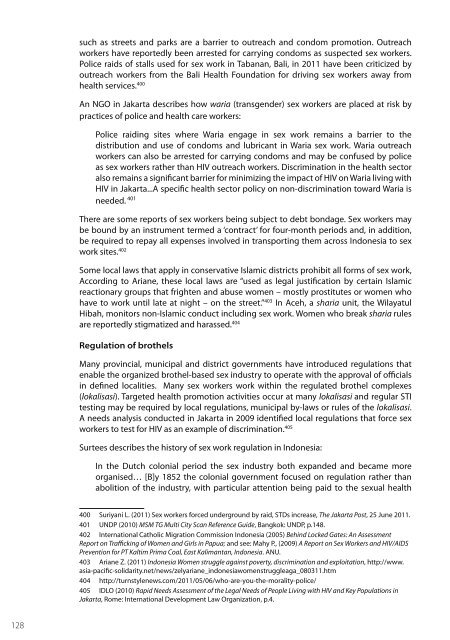SEX WORK AND THE LAW - HIV/AIDS Data Hub
SEX WORK AND THE LAW - HIV/AIDS Data Hub
SEX WORK AND THE LAW - HIV/AIDS Data Hub
Create successful ePaper yourself
Turn your PDF publications into a flip-book with our unique Google optimized e-Paper software.
such as streets and parks are a barrier to outreach and condom promotion. Outreach<br />
workers have reportedly been arrested for carrying condoms as suspected sex workers.<br />
Police raids of stalls used for sex work in Tabanan, Bali, in 2011 have been criticized by<br />
outreach workers from the Bali Health Foundation for driving sex workers away from<br />
health services. 400<br />
An NGO in Jakarta describes how waria (transgender) sex workers are placed at risk by<br />
practices of police and health care workers:<br />
Police raiding sites where Waria engage in sex work remains a barrier to the<br />
distribution and use of condoms and lubricant in Waria sex work. Waria outreach<br />
workers can also be arrested for carrying condoms and may be confused by police<br />
as sex workers rather than <strong>HIV</strong> outreach workers. Discrimination in the health sector<br />
also remains a significant barrier for minimizing the impact of <strong>HIV</strong> on Waria living with<br />
<strong>HIV</strong> in Jakarta...A specific health sector policy on non-discrimination toward Waria is<br />
needed. 401<br />
There are some reports of sex workers being subject to debt bondage. Sex workers may<br />
be bound by an instrument termed a ‘contract’ for four-month periods and, in addition,<br />
be required to repay all expenses involved in transporting them across Indonesia to sex<br />
work sites. 402<br />
Some local laws that apply in conservative Islamic districts prohibit all forms of sex work,<br />
According to Ariane, these local laws are “used as legal justification by certain Islamic<br />
reactionary groups that frighten and abuse women – mostly prostitutes or women who<br />
have to work until late at night – on the street.” 403 In Aceh, a sharia unit, the Wilayatul<br />
Hibah, monitors non-Islamic conduct including sex work. Women who break sharia rules<br />
are reportedly stigmatized and harassed. 404<br />
Regulation of brothels<br />
Many provincial, municipal and district governments have introduced regulations that<br />
enable the organized brothel-based sex industry to operate with the approval of officials<br />
in defined localities. Many sex workers work within the regulated brothel complexes<br />
(lokalisasi). Targeted health promotion activities occur at many lokalisasi and regular STI<br />
testing may be required by local regulations, municipal by-laws or rules of the lokalisasi.<br />
A needs analysis conducted in Jakarta in 2009 identified local regulations that force sex<br />
workers to test for <strong>HIV</strong> as an example of discrimination. 405<br />
Surtees describes the history of sex work regulation in Indonesia:<br />
In the Dutch colonial period the sex industry both expanded and became more<br />
organised… [B]y 1852 the colonial government focused on regulation rather than<br />
abolition of the industry, with particular attention being paid to the sexual health<br />
400 Suriyani L. (2011) Sex workers forced underground by raid, STDs increase, The Jakarta Post, 25 June 2011.<br />
401 UNDP (2010) MSM TG Multi City Scan Reference Guide, Bangkok: UNDP, p.148.<br />
402 International Catholic Migration Commission Indonesia (2005) Behind Locked Gates: An Assessment<br />
Report on Trafficking of Women and Girls in Papua; and see: Mahy P., (2009) A Report on Sex Workers and <strong>HIV</strong>/<strong>AIDS</strong><br />
Prevention for PT Kaltim Prima Coal, East Kalimantan, Indonesia. ANU.<br />
403 Ariane Z. (2011) Indonesia Women struggle against poverty, discrimination and exploitation, http://www.<br />
asia-pacific-solidarity.net/news/zelyariane_indonesiawomenstruggleaga_080311.htm<br />
404 http://turnstylenews.com/2011/05/06/who-are-you-the-morality-police/<br />
405 IDLO (2010) Rapid Needs Assessment of the Legal Needs of People Living with <strong>HIV</strong> and Key Populations in<br />
Jakarta, Rome: International Development Law Organization, p.4.<br />
128
















